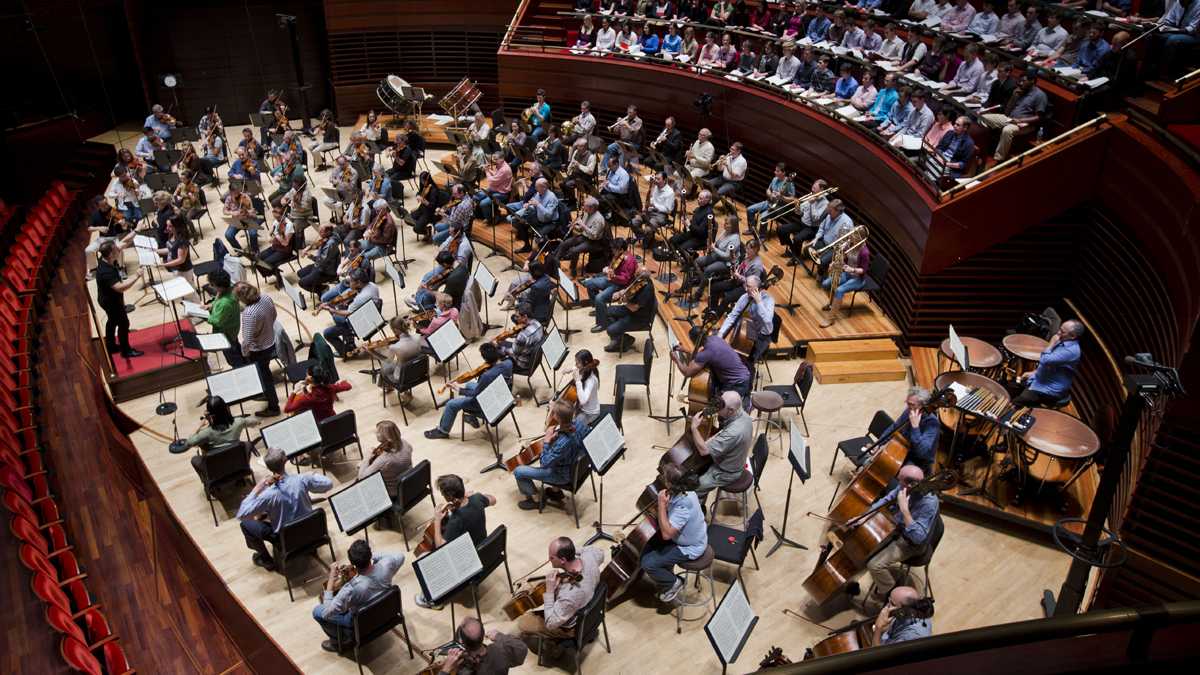Philadelphia Orchestra making sound investments in the community
Listen
The Philadelphia Orchestra announced a roster of programs to promote education and community access to music.(AP file photo)
The Philadelphia Orchestra has announced a roster of programs to promote education and community access to music. A newly structured department called HEAR — Health, Education, Access, Research — is an umbrella for new and already existing programs.
“We’re not an orchestra that sits inside a building or an ivory tower,” said President and CEO Alison Vulgamore, who will announce the HEAR initiatives at Thursday evening’s free pop-up performance at the Kimmel Center. “We’re people who want to share our music-making. We want to be part of the social agenda in Philadelphia.”
For one such program, the orchestra has taken a page from socially conscious companies such as Warby Parker, the eyeglass manufacturer that gives a pair of glasses to a person in need for every pair you buy.
This summer the Eastman Music Company, in consultation with musicians of the Orchestra, will unveil a new line of instruments, starting with strings and expanding later into other families of orchestral instruments. For every instrument sold in stores, another will be given to the Philadelphia School District.
“As you climb the ladder for success, you’re reaching down the ladder to bring someone up with you,” said Dan Berkowitz, the orchestra’s director of collaborative learning. “’La Scala’ is Italian for ladder, and that what the line will be called.”
About 80 percent of students in the Philadelphia district do not have the opportunity to play in ensembles, and more than 1,500 broken musical instruments sit in the district’s inventory.
“Together we’re going to have a large impact on the public school narrative, and to insure the instruments getting into their hands are high quality,” said Berkowitz. “There’s no bigger barrier to learning music than having an instrument that doesn’t function.”
Another effort in the Orchestra’s HEAR department involves music therapy for the homeless, in collaboration with Temple University and the Broad Street Ministry, which helps about 7,500 homeless and impoverished people a year.
“As it turns out, Temple University has one of the best music therapy departments in the country, if not the world,” said Berkowitz. “We decided to start to a project in just a 14-week construct that has research wrapped around it, that looks at music’s impact on quality of life.”
The orchestra already has an array of community engagement initiatives including family and preschool events; tickets for teenagers; Young Friends activities for adults; free neighborhood concerts; and PlayINs wherein amateur instrumentalists can play alongside the orchestra’s musicians.
Vulgamore said the group wants to do what it can to help alleviate the city’s problems concerning poverty, wellness, and education.
“There are some extraordinary statistics about living in our city,” said Vulgamore. “The orchestra has decided this is important work for an orchestra. It’s not just about great concerts, but being with people where they are.”
The orchestra has also become more active in the All-City Orchestra, an ensemble of teenagers throughout the public school system. The orchestra will provide rehearsal time and performance venues for that student orchestra, as well as access to music director Yannick Nézet-Séguin.
.
WHYY is your source for fact-based, in-depth journalism and information. As a nonprofit organization, we rely on financial support from readers like you. Please give today.





